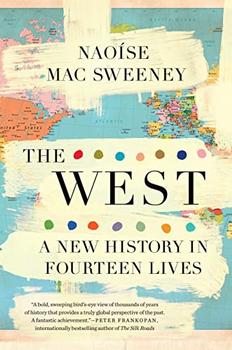Summary | Excerpt | Reviews | Beyond the Book | Readalikes | Genres & Themes | Author Bio

 Book Reviewed by:
Book Reviewed by:
Rose Rankin
Buy This Book
It argues two things. The first is that the grand narrative of Western Civilisation is factually wrong. The modern West does not have a clear and simple origin in classical antiquity and did not develop through an unbroken and singular lineage from there through medieval Christendom, the Renaissance and the Enlightenment to modernity. Western identity and culture were not passed down, like a "golden nugget" as the academic and philosopher Kwame Anthony Appiah has described it, along this line. Problems with this grand narrative were first identified more than a century ago, and the evidence against it is now overwhelming. Today, all serious historians and archaeologists acknowledge that the cross-fertilisation of "Western" and "non-Western" cultures happened throughout human history, and that the modern West owes much of its cultural DNA to a wide range of non-European and non-white forebears. Yet the nature and nuances of these cultural interactions remains to be fully untangled, and the shape of a new grand narrative to replace that of Western Civilisation is yet to emerge. Contributing to this work was part of my motivation for writing this book. The rest of my motivation came from reflecting on the troubling fact that all the historical evidence amassed and all the scholarly consensus against the grand narrative of Western Civilisation have had relatively little impact on the wider public consciousness. The narrative remains ubiquitous in contemporary Western culture. Why do we (that is, Western societies, broadly speaking) still cling so doggedly to a vision of history that has been so thoroughly discredited?
The second main argument of this book is that the invention, popularisation and longevity of the grand narrative of Western Civilisation all stem from its ideological utility. The narrative exists – and continues to exist today long after its factual basis has been thoroughly disproved – because it serves a purpose. As a conceptual framework, it has provided a justification for Western expansion and imperialism, as well as ongoing systems of White racial dominance. This does not mean that the grand narrative of Western Civilisation is the brainchild of some evil mastermind, cynically scheming to engineer a false view of history to further their cause. Quite the opposite. Rather, the weaving of this story was piecemeal and haphazard, owing as much to serendipity as to calculation. It is a grand narrative comprised of many micronarratives, interlinked and interleaved, all of which have been separately deployed in the service of specific political ends. They include the idea of classical Athens as a beacon of democracy, used as a foundation charter for modern Western democracy; the notion of the fundamental Europeanness of ancient Romans as a basis for shared European heritage; and the myth of the Crusades as a simple clash of civilisations between Christendom and Islam, justifying anti-Western jihad on one side and the "War on Terror" on the other. The ideological utility of these individual micronarratives, and others like them, is well documented; each has been told because it fits the expectations and ideals of the particular teller. Individually, these stories are various and fascinating, and I hope that readers will enjoy exploring some of their dazzling diversity in the pages of this book. Collectively, however, they make up the grand narrative of Western Civilisation and serve as the origin myth of the West.
The West is not, of course, the only sociopolitical entity that has retrospectively constructed a narrative of its past that fits its needs and self-image in the present. The politicised reimagining of history is in fact pretty standard practice and has been going on as long as history itself has been written (and probably even long before this, through oral histories and community storytelling). It was said that in Athens in the sixth century BCE, lines were added to the Homeric Iliad to imply that Athens had controlled the island of Aegina in the age of heroes. Unsurprisingly, these lines were inserted at precisely the time that Athens was trying to control Aegina. More recently, after the modern nation-state of Turkey was proclaimed in 1923, a complex historical and archaeological programme, known as the "Turkish History Thesis", was put into place to strengthen the identification between Turkishness and the landmass of Anatolia. More recently still, under the leadership of Xi Jinping, a new official narrative about China's role in the Second World War has been aggressively promoted, in ways that may be worrying or encouraging depending on your point of view.
Excerpted from The West by Naoíse Mac Sweeney. Copyright © 2023 by Naoíse Mac Sweeney. Excerpted by permission of Dutton. All rights reserved. No part of this excerpt may be reproduced or reprinted without permission in writing from the publisher.





The Flower Sisters
by Michelle Collins Anderson
From the new Fannie Flagg of the Ozarks, a richly-woven story of family, forgiveness, and reinvention.

The House on Biscayne Bay
by Chanel Cleeton
As death stalks a gothic mansion in Miami, the lives of two women intertwine as the past and present collide.

The Funeral Cryer by Wenyan Lu
Debut novelist Wenyan Lu brings us this witty yet profound story about one woman's midlife reawakening in contemporary rural China.
Your guide toexceptional books
BookBrowse seeks out and recommends the best in contemporary fiction and nonfiction—books that not only engage and entertain but also deepen our understanding of ourselves and the world around us.